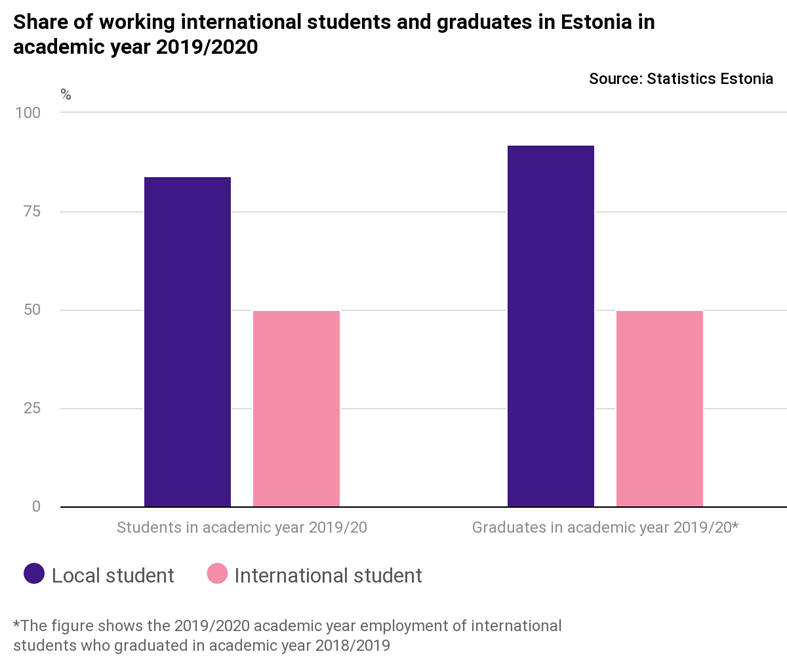In academic year 2019/2020, there were 5,520 international degree students studying in Estonian universities, which is the highest number ever.
According to Kadri Rootalu, data scientist at Statistics Estonia, the analysis showed that international students did not work as often as local students. “While 84% of local students worked besides studying, only half of international students did. Income and social tax paid for working international students in academic year 2019/2020 amounted to 10 million euros, which is 2 million euros more than the year before. International students who graduated in academic year 2018/2019 contributed an additional 3.6 million euros in taxes,” said Rootalu.

Eero Loonurm, head of the Study in Estonia programme at the Education and Youth Authority said that the contribution of international students to the Estonian economy outweighs state investments in their studies. “In addition to international students and graduates participating in the labour market and the tax revenue from it, their studies in Estonia also mean tuition, living costs and visits to Estonia by their families,” added Loonurm. He noted that the International Student Barometer study of the international research centre I-graduate showed that the expenditures of international students on just housing and daily life totalled around 33 million euros in the last academic year.
A more detailed overview in Estonian language is in the statistics blog.
The analysis report in Estonian is available here.
Main findings:
- Half of international students in Estonia work besides studying, compared to more than 80% of local students.
- The share of international students who worked during studies in academic year 2019/2020 was slightly smaller than the year before.
- The most likely to work besides studying are international students in information and communication technologies; engineering, manufacturing and construction; and business, administration and law. Of international students studying ICT, around two thirds worked besides studying in academic year 2019/2020.
- Graduates of ICT and engineering, manufacturing and construction are also more likely to stay working in Estonia.
- The least likely to work during studies are students of agriculture and health and welfare.
- In academic year 2019/2020, the most common economic activities of the enterprises where international students work were information and communication, accommodation and food service activities, and education.
- International graduates contributed the most to information and communication enterprises, followed by manufacturing and financial, and insurance enterprises.
- Compared to local students, international students work more often in foreign-owned enterprises.
- During the emergency situation last spring, international students were more likely than local students to lose their jobs.
- In academic year 2019/2020, international students paid 3.1 million euros in income tax and 7 million euros in social tax in Estonia.
- In academic year 2019/2020, the international students who graduated in academic year 2018/2019 paid 1.2 million euros in income tax and 2.4 million euros in social tax in Estonia.
Read also: 2018/2019 analysis of economic impact of working international students in Estonia
Study in Estonia is a cooperation initiative that introduces Estonia as a country offering high quality higher education opportunities. All Estonian institutions of higher education, at which it is possible to study in at least one program that is taught fully in English and is internationally recognised, can participate in the programme. The activities of Study in Estonia are coordinated by the Estonian Education and Youth Board in the framework of the Dora Pluss program, which is being realised via the European Regional Development Fund (ERDF) and with the aid of EU structural support.
